Bastion of the Brave
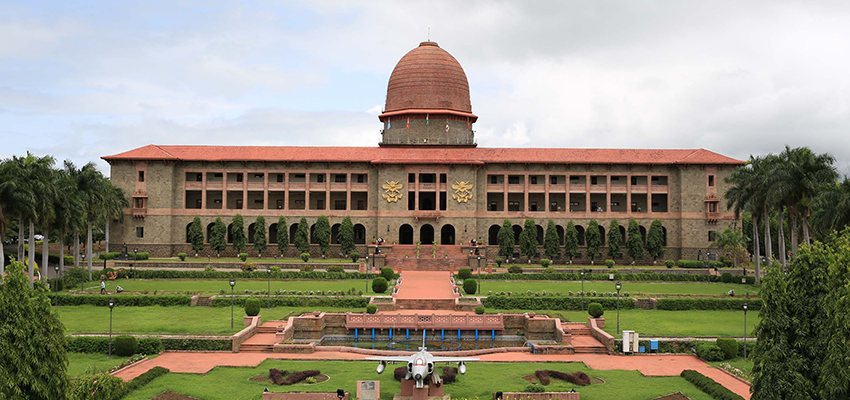
Ensconced in the lush green lap of Khadakwasla, the august portals of the National Defence Academy(NDA) silhouetted against the panoramic backdrop of the Khadakwasla Lake and historic Sinhagad fort, have a fascinating tale to tell. They are more than a training ground of all three services of the Indian Armed Forces; they are testimony to a time-honoured tradition: service before self, loyalty unto death—towards their nation, their brother officers, and the men they command.
The roll call of honour reads long: 27 service chiefs of staff, 3 Param Vir Chakra and 12 Ashok Chakra Awardees and counting, even as the NDA lives up to its commitment of turning out officers and gentlemen who embody the principles of a sovereign and secular republic.
Given the backdrop of the NDA’s ongoing diamond jubilee celebrations, here’s speaking to the Commandant, Deputy Commandant, alumni and war veterans on their memories of the academy, their service in the 1971 war (the first war post-Independence that was fought by the combined strength of all three services—the Army, Navy, and Air Force, and what lessons corporates could imbibe from the travails of the faujis.
Some legacies are forever. Some voices shall always ring true. In these jaded times, how reassuring it is to revel in their comforting clarity
The Triumph of Tenacity
Lieutenant General B T Pandit, belongs to the 6th Course of NDA. In 1955 he was commissioned in Madras Sappers of the Army. He had the honour to command the 9 Engineer Regiment during the 1971 Indo-Pak War in the Western Theatre. He was awarded the coveted Vir Chakra for leadership and gallantry in the face of the enemy. He was selected for the General Cadre and successively commanded an Inf Bde, Inf Div and Corps, in various operations. For the successful conduct of these, he was awarded PVSM in 1991. He retired in 1992 as the Adjutant General of the Army. Physically fit and mentally alert at the age of 90 years he shares nostalgic memories as a cadet in NDA, his command experience in the 1971 war and briefly gives his views on the corporate world and the military leadership.
By Vinita Deshmukh
"Our motto “Nation first, my men next and myself always last” says it all. This makes the armed forces the most reliable instrument of the Nation-State"
Those were the days
I was born in a middle-class family in the small village Ghatanji in Yavatmal District of Maharashtra. After my primary education, I did my middle school in Nagpur and later in high school in Yavatmal where my parents had settled down by then. I was good at studies as also was outdoors/ sports/ trekking minded.
I was first lured by ‘uniform’, since one Rashtriya Swayamsevak Sangh(RSS) Shakha was near our house in Nagpur. Later I joined the boy scouts and the newly established National Cadet Corps(NCC). I had the privilege to give a salute to the flag hoisting on 15th August 1947 and 26th January 1950. Both were very unforgettable events.
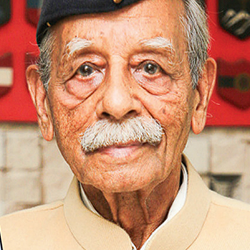 Lieutenant General B T Pandit (Retd.)
Lieutenant General B T Pandit (Retd.)(Batch - 1951-1953)
While in this patriotic fervour, I read about the newly established NDA at Dehradun. On automatic impulse, I applied for the UPSC entrance exam and to everyone’s surprise passed and was called for Services Selection Board (SSB) at Bangalore. However, at the same time, my matriculation exam result was declared. I had done very well standing 4th in the order of merit and securing six distinctions. I was also offered three scholarships for pursuing higher education. My parents sensing that I had good potential and perhaps under social pressure, declined permission to go for the SSB interview. However, destiny willed otherwise. Due to my mother’s serious ailment and to relieve the family of my education expenses, I again applied for the 6th Course of the Joint Services Wing (JSW)of the NDA. This was a two-year preparatory training before moving to the IMA. As per joining instrs(instructions) I reached Dehradun in the 2nd week of July 1951 all set to become a commissioned officer in the Indian Army.
We were under this illusion till a tough NCO who had come to receive-rather collect us, ordered us in a gruff voice not to employ coolies but pick up our own baggage. We were loaded in huge army trucks for nearly half an hour’s journey to our barracks. This literally brought us down to earth.
These were early days for the newly formed JSW (now NDA) and infrastructure was not fully established. We were housed in old barracks that had housed 2nd World War prisoners of war. Also, the customs, traditions and SOPs were still a work in progress and essentially borrowed from the Royal Military Academy, Sandhurst, UK. We also had a number of British NCOs for training us in drill and PT. They had a great and unique sense of humour.
We the new entrants numbering about 130, were a diverse lot coming from different social backgrounds and earlier schooling. Hailing from all parts of the country, economic standing, religion, language, and public schools/ municipal schools, was completely bewildering. Most of us were not conversant with the Western style of living, dressing, table manners.
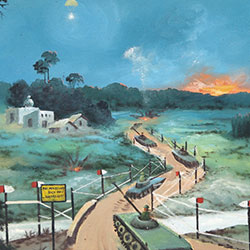
Another big problem was the much talked of ragging. In retrospect too, I feel this is a useful method of mental toughening up, provided it is meant that way. At times, however, it could take a nasty and sadistic turn. Those who ragged us became our friends and mentors too. I also realised that NDA is a bridge course to prepare and toughen up a young (some not even sprouting beard/ moustache) boy for the hardships of his chosen career.
We had a mix of military and civilian instructors. Those days our civilian faculty was excellent and approachable, and largely they are remembered with respect and affection even today.
Food was excellent and nourishing something like 3,500 calories per day. Even then we seemed to be perpetually hungry. With all this, slowly we formed personal friendships and comradeship; gained in self-confidence and were ready for the next step, the IMA.
I passed out in June 1953 and joined 15 IMA Course in August 1953 and later after two years of arduous training was commissioned as a Second lieutenant on 2nd June, 1955.
Of Wars and Skirmishes
There is a saying that only lucky soldiers get to see war. Luckier ones get good tasks, succeed, survive and get decorated. I certainly was one of that blessed breed. I had the honour to experience and participate in 1971 Indo-Pak War, earlier 1965-67 guerilla warfare in Nagaland, Op Brasstacks in Rajasthan’s Barmer Sector, LOC in J&K from 1986-88, ops against Khalistani terrorists in Punjab 1989-90. I was awarded coveted Vir Chakra for gallantry in the face of the enemy in 1971 and PVSM for conduct of ops and along LOC in Rajouri- Poonch sector in J&K and anti-terrorist ops in Punjab 1989-90.
1971: War Nostalgia
Although I successively rose to the rank of Lt. Gen. and commanded the highest field formation Corps, the highlight of my career shall remain 1971 Indo-Pak War when as Lt. Col. I had the honour to command the 9 Engineer Regiment as part of offensive deep into Pak heartland of Punjab.
During the offensive operations in the Western Sector from December 5th to 17th, 1971, I held the position of commanding an engineer regiment. This strategic area presented formidable challenges, characterised by an absence of road communication networks and a landscape marked by natural and artificial obstacles. These obstacles posed significant hurdles for the movement of our fighting units. Our engineer regiment played a crucial role, involving tasks such as breaching two deep minefields, constructing roads and tracks, and facilitating the crossing of the formidable Basantar River. The complexity of the terrain, coupled with the fierce resistance from the enemy and intense shelling, made these operations exceptionally demanding. This battle of Basantar was the biggest and most decisive action of that war. I owe my Vir Chakra to our gallant jawans, arguably the best in the world.
STRATEGIES OF SURVIVAL FOR THE CORPORATE WORLD
This is a very debatable issue. I feel that leadership and management are two sides of the same coin. Yet there is a subtle difference because the aims and objectives of corporate management and the army are totally different. The emphasis in the first is on material/ financial aspects, while in the latter the focus is on human elements. As a result, the cost/benefit analysis is always poles apart.
In the army, we treat our jawans as our people. No hire and fire relationship. We send them in harm’s way, but always take care of their welfare. This ensures a strong bond among us, which is a key war-winning factor. We look at our service as a way of life and our men are not mere employees. When we talk of our men, you would see the gleam in our eyes. And same applies when men talk about Hamara Saab. Indeed, great symbiotic relationship. A personal example, sharing hardships, success yours and failure mine, are some of our guiding principles. And believe me, it is incredibly rewarding to cmd(command), lead and manage people who are willing to die for you.
Finally, our motto “Nation first, my men next and myself always last” says it all. This makes the armed forces the most reliable instrument of the Nation-State.
NDA—An epitome of Leadership
Lieutenant General Dalip Bhardwaj, who so proudly recounts his fruitful NDA training, the invaluable lessons learned from his time in the army, and a plethora of other experiences that have shaped his journey
By Ekta Katti
The NDA takes a rough-cut stone and polishes it so masterfully that it transforms into a dazzling diamond, illuminating the country with its radiant brilliance
Just as we uttered the word “NDA”, his face instantly beamed with pride. Standing tall with squared shoulders with head held high, he exuded an aura that conveyed both strength and determination, coupled with an unmistakable sense of courage and confidence. “I couldn’t help but feel an overwhelming sense of love and reverence for the institution that had played such a pivotal role in shaping me. The NDA takes a rough-cut stone and polishes it so masterfully that it transforms into a dazzling diamond, illuminating the country with its radiant brilliance,” smiled Bhardwaj.
Those were the days
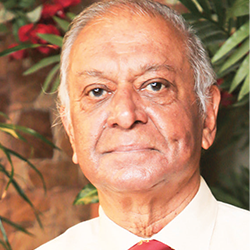 Lieutenant General Dalip Bhardwaj (Retd.)
Lieutenant General Dalip Bhardwaj (Retd.)(Batch - 1967-1970)
There was no shortage of inspiration or motivation for Bhardwaj. “My father, Air Vice Marshal VN Bhardwaj, was commissioned in the Royal Air Force in 1941, where he fought the war in England. After India gained independence, he was transferred to the Royal Indian Air Force. Besides that, many of my relatives from both my parents’ side were in the Armed Forces. So, I’ve had a very privileged and blessed background as a child.” Thus, for him, enrolling in the NDA was a clear and natural decision. He joined the NDA in 1967 in 38th NDA course. He was born in Delhi, and went to Nainital to attend Sherwood College, which holds a special place as his alma mater.
He instantly agreed when we asked if NDA transforms a civilian into a cadet, and later into an officer gentleman. Engaging in the art of boxing, and excelling at it, provided him with a clear sense of direction in every aspect of life, this in fact made his training at the NDA the most memorable. “Boxing nurtures various aspects of your being beyond just physical strength. It hones numerous attributes within you and brings them to the forefront. It imparts lessons in tenacity, strengthens your psychological and tactical preparedness, and above all, grants you a sense of fulfilment,” he said.
Bhardwaj could easily correlate this art with fighting the war on the battlefield. “Every aspect of the sport revolves around your mindset, as you strive to outsmart your opponent through tactics, preparation, and unwavering tenacity, utilising everything you possess. It’s a comprehensive blend of various attributes, not just a reckless display of brute force to knock out your opponent. If you approach it in that manner, you’ll likely face defeat. Instead, boxing encompasses a multitude of skills. That’s precisely why boxing is deemed essential—it imparts valuable lessons and teaches you a great deal. It indeed prepared me to face the opponents on the battlefield,” he added. He learnt to swim at Sherwood and swam the Nainital Lake too, he later excelled in swimming and athletics at the NDA.
1971: War Nostalgia
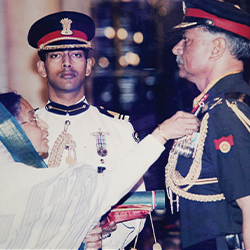
Six months post the IMA training, the 1971 war was about to break. Talking about the war, he said, “We had to undergo our Young Officers’ course. We were all young and eager to fight for our nation. We could sense the tension and developments which indicated that war was imminent. Within a week of going to Ahmednagar for the Young Officers’ course, all 14 of us were sent back to our units as our regiments needed us. He further added, “My particular regiment was stationed in the western front as part of the strategic reserve because it was anticipated that Pakistan’s armoured division would be launched in our sector. Although my regiment did not engage in actual combat and cross the international border, we were constantly on the move, countering Pakistan’s division and preventing them from making any significant advancements. There was plenty of artillery shelling, but we didn’t physically cross the border.”
However, in their young minds, the belief in victory was unwavering. “We knew that there was no room for runners-up; we had to be the winners. That mindset was instilled in us at the academy, and it drove us in 1971 when we went fully prepared. We were fully aware that to fulfil our duty to the nation we have to emerge victorious,” he expressed.
The Glorious 38th NDA course
As an NDA alumnus, he takes immense pride in his alma mater and holds the NDA in the highest esteem. His was one of the few batches that broke all records. “Looking back on our 38th NDA course, our coursemates achieved remarkable feats. Second Lieutenant Arun Khetarpal received the highest decoration for valour in operations, the PVC (Posthumous), while Col NJC Nair was honoured twice, first with the Kirti Chakra and later with the Ashoka Chakra (Posthumous). It’s worth noting that both these are the highest gallantry awards in war and peace earned by our coursemates. Furthermore, Captain Gopinath, Captain Jayant Poovaiah, Captain Sameul and Captain Rawal took the pioneering step of establishing Deccan Air, the first low-cost commercial airline. In the field of education, Major Brar, Col Ravi Pillay, and Col Vinod Marwaha have excelled and established renowned institutes. The achievements of our fellow course mates have been truly commendable and inspiring.,” he proudly added.
Post-retirement Saga
During his remarkable 40-year service to our country, he achieved numerous milestones. In 1982, he was nominated to attend a long course in Leningrad (former USSR), a prestigious opportunity that further enhanced his skills and knowledge. “In 1998-99, I was chosen to lead the first Indian Contingent to the UN Peacekeeping Force in Lebanon, providing me with valuable experience in international peacekeeping efforts,” he said. His dedication and contributions have left an indelible mark on the nation’s defense and peacekeeping endeavours.
Before he signed off, he gave a heartfelt message to the young guns about to join the Armed Forces, “There is no better profession or career path than the one you choose to embark on. Know that it will come with its challenges. However, rest be assured that you will receive support from everyone throughout your journey. There is no better career than to serve your country.” In the end, his resonant and unwavering voice, coupled with the strength in his eyes, attested to the immense love he holds for his country. Even now, he remains prepared to face any battle to safeguard his nation.
STRATEGIES OF SURVIVAL FOR THE CORPORATE WORLD
The military training, cadets undergo fosters character development, preparing them to confront life’s adversities with readiness. “This is precisely why the journey from military to management becomes smooth. After retiring from the military, I took on the role of CEO at a company, initially focused on manufacturing Armoured Fighting Vehicles for the army. However, due to the prevailing circumstances at that time, I served there for about three years before leaving. Subsequently, I relocated to Pune, where I am currently settled. Keeping the values of integrity, loyalty, never give up attitude and patience, I faced all the challenges in the corporate world. In life, mistakes are bound to be made but getting up and moving on is the only option,” says Lieutenant General Dalip Bhardwaj.
NDA makes you Grow, Evolve, Shine
Air Commodore Ram Mohan Shridharan joined the IAF in 1969—two years before the onset of war. After his training in the NDA, he went onto join the Helicopter Training School, Jodhpur. By the time war was declared in December 1971, he was a fully qualified Captain on MI-4 with the 110 Helicopter Unit. The Vayu Sena awardee was notably among the ten pilots who flew the surrender team to Dacca and witnessed the historic function and the birth of a new nation—Bangladesh. The son of an Army doctor, he was first drawn to the attractions of the Air Force when he saw a training programme on a visit to the academy at the age of ten—as a result, he joined the NDA in 1964 to earn the coveted blue uniform. Here, he highlights the role played by an important unit of the Indian Air Force: the helicopter pilots who carry men and materials to destinations against all odds
By Kalyani Sardesai
"The academies made men out of boys and leaders out of individuals. You learnt public speaking and the art of small talk; the correct dress and deportment, the importance of time"
Those were the days
It took me four years to pass out from the academy as opposed to three. As it happened, I lost my father—a colonel and a doctor—whilst in the NDA. It was a great loss, and as such my memories are tainted by that loss.
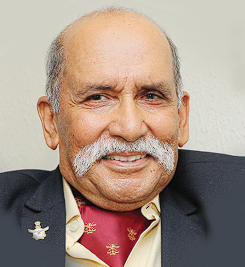 Ram Mohan Shridharan (Retd.)
Ram Mohan Shridharan (Retd.)(Batch - 1964-1967)
That said, the academy gave every opportunity to everyone to grow, evolve and shine. You had to earn your privileges all the way—be it the drill test that you needed to pass before you were allowed out of the academy on weekends or the tasks you had to complete before you earned your right to rest. Despite the punishing physical regimen, you had to pass with decent grades. It is thus a myth that Padhaai (study) is not important in the services—truth is, you are studying till you retire.
The academies made men out of boys and leaders out of individuals. You learnt public speaking and the art of small talk; the correct dress and deportment, the importance of time. Above all, you learnt to take ragging in your stride: whether you were front rolling on the lawn after dusk or lined up by your seniors in the middle of the night. The toughest punishments were reserved for breaking a moral code. Telling a lie was neither expected nor accepted of an officer. These were important lessons in character-building.
We participated in camps and runs of varying levels of difficulty. Camp Greenhorn that taught us the basics of survival in harsh terrain— from digging up trenches to pitching tents and dealing with snake bite to sleeping under the stars—was the first in a series of increasingly tough camps. Then there was the ‘Josh’ run that needed you to run from camp to the academy. The individual was judged on his ability to complete tasks—the leader on his ability to get those tasks done.
1971: War Nostalgia
My unit, the 110 HU was tasked with lifting the army units of 4/5 Gorkha Rifles as well as 57 Mountain Division of the 6011 troops and their support elements, across the Meghna, which played a huge role in the fall of Dacca. What’s more, our unit also heli-lifted the surrender 2 team in 5 Mi-4s to Dacca on December 16, for the Surrender Ceremony at Ramana Racecourse.
In the course of action, I took part in the world’s first night Heliborne Operation from Kailashahar to Sylhet, which happened to be behind enemy lines in East Pakistan. During the operation, my helicopter did get hit but we continued flying and returned to Kailashaher to repair the chopper. We finally lifted the Gurkhas along with valuable artillery gun and ammunition, equipment, and rations safely to Sylhet. After the success of this operation, the legendary army commander General Sagat Singh and our Helicopter Task Force Commander wanted us to airlift more army troops across the mighty Meghna River, which was at some points, 16 miles wide. Predictably, the Pakistanis had blown up the bridges while retreating-to delay us. So, 14 helicopters were put to work. I flew day and night to lift troops and their rations and equipment across the Meghna to speed up the move of our army to Dacca. There was no time to eat, sleep or rest; every moment was precious. We were ably supported by our technical officers who also worked without pause to service our helicopters. I flew 67 sorties, including 22 by night to emerge one among the top three pilots who flew the maximum sorties during the war.
It was no easy task—the challenges of night flying were many as this was an older generation helicopter not yet properly geared for night operations. Landing at night was tricky business but training helped us immensely. Plus, we were familiar with the terrain as we had flown many hours in adjoining Assam and Tripura. We expected the war to last much longer and were pleasantly surprised when we achieved our objectives and in record time, thanks to our commanders. Soon, we established complete air superiority over East Pakistan. Add to that the complete blockade of the Bay of Bengal by the Indian Navy, and Dacca fell in record time. We celebrated with rum punch and a delicious dinner.
A life in the fauj is still a life worth aspiring to
This is true even today. You are working towards something bigger than yourself; the quality of life and the friendships you make along the way are not to be undermined. It’s also a fact worth remembering that inevitably defence kids make good in life given the exposure and challenges they experience, growing up.
STRATEGIES OF SURVIVAL FOR THE CORPORATE WORLD
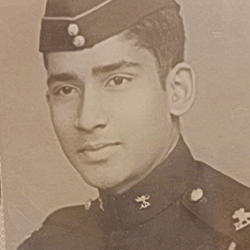
The armed forces are not only task-oriented but also time-oriented. Those who don’t respect time are left behind by the times. Coming five minutes before time is a teaching imbibed by Faujis across the board. I served in the VIP squadron—flying both national and international dignitaries—from PMs like Indira Gandhi, Rajiv Gandhi and Charan Singh to leaders like Yasser Arafat and the Kings of Jordan and Bhutan to the Pope. The door open time of the helicopter had to be followed to the minute—that’s when the VIP would step in---no tardiness was allowed. Precisely that time had to be communicated to the Air Traffic Controller or the ATC.
Secondly, each member of your team deserves respect: from the chap who brings you your chai to the Air Traffic Controller, you are part of a system that ensures your success and movement. Never forget that.
Thirdly, learn to obey orders and get along with the team before you learn to give orders. Fourthly, we were absolutely focused on the mission of the movement—even when there were bullets flying around. We thought of nothing but our goal.
Fifthly, both the quality and quantity of training are important for a professional.
Courage, Sacrifice and Honour
This is a tale of inspiration, resilience, and unwavering patriotism of ex-NDA cadet, and 1971 India- Pakistan war hero Brigadier Prakash Ghogale, Vishisht Seva Medal (VSM)
By Ekta Katti
These three years of NDA (65-67) have been the best. I understood that disciplined leadership was essential for achieving success. Soon camaraderie, integrity, humility and the code of honour became the cornerstone of my foundation at the NDA
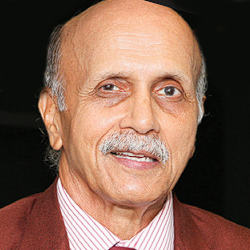 Brigadier Prakash Ghogale (Retd.)
Brigadier Prakash Ghogale (Retd.)(Batch - 1965-1967)
He possesses excellent communication skills, exudes a stylish and polished demeanour, speaks in a gentle tone, and above all, displays admirable humility. However, when it comes to the field, he unleashes his full potential to fiercely protect his nation and fellow citizens. “Desh ke liye kuch bhi,” he smiled. His charismatic persona and unwavering enthusiasm can be attributed to his origins as a son of a reputed Judge Tularam Ghogale, the invaluable learning from NDA and Army, and undoubtedly his personal journey.
He was born in Pune and is the youngest among the seven brothers. However, due to his father's job, he had the privilege of travelling throughout the then Bombay State. “My elder brother, a veteran of the 1965 war, served as a great inspiration to me. However, originally, I was meant to pursue a career in medicine. As fate would have it, I decided to take the Military Entrance Exam just for fun, and to my surprise, I secured the fifth position in the All-India Merit list. The former Commandant of the NDA, Major General Ranbir Bakshi, Military Cross, happened to be a close friend of my father, who too inspired me to join the NDA,” he said.
Those were the days
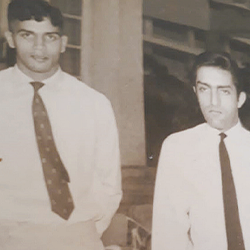
Ghogale was always studious and aimed for perfection, hence living the strict NDA life was never a hassle. “These three years (65-67) have been the best. I understood that disciplined leadership was essential for achieving success. Soon camaraderie, integrity, humility and the code of honour became the cornerstone of my foundation at the NDA. Additionally, the vast library in the NDA provided me with solace and knowledge.”
During his NDA days, he developed a strong passion for cricket. Touted as 'the man of the hour,' his exceptional bowling and quick thinking ensured several victories for his NDA Cricket team, which won the Maharashtra Invitation League for the first and last time. “As a pace bowler, I was frequently entrusted with the ball during crucial moments. While pressure was definitely present, it provided me with an opportunity to think quickly and adapt. More often than not, I found myself taking the crucial wickets that led to victory. Being able to nurture my love for cricket during my time at the NDA brought me immense joy. This situation of sneaking out a victory from the opposition has taught me to hold my nerves, and never give up.”
Despite being a studious cadet who excelled in drill, Ghogale had a humorous side as well. One day, the homesick cadet had a strong urge to meet his family. “I managed to sneak out of the NDA to surprise my family with a visit. However, to my utter shock, my father's friend, the Commandant, also decided to pay us a visit. Unable to face the situation, I resorted to hiding under the bed until he left. Looking back, this incident was one of the most humorous moments of my NDA tenure. And it never fails to bring a smile to my face,” he said. Soon after passing out of the NDA, he joined the Indian Military Academy and after that was posted to Manipur in the Insurgency infested area as a youngster in the 8th Battalion Brigade of the Guards.
1971: War Nostalgia
His once-beaming face turned grim as he spoke about the 1971 war. "The Battle of Hilli stands as a remarkable testament to the extraordinary courage, sacrifice, and unwavering determination of a brave group of soldiers who defied all odds to achieve victory. Conquering the enemy and emerging triumphant was not a cakewalk for our battalion of 8 Guards. Lasting 42 hours, this battle exemplifies the indomitable spirit of the Indian Army in overcoming formidable adversaries like the 4 Frontier Force of the Pakistani Army,” said a teary-eyed Ghogale. However, amidst the victory, he cannot forget the poignant aspect of some of our fallen heroes not receiving the recognition they deserved. “The 68 souls killed in action can rest in peace, knowing that their heroic deeds have been immortalised in the War Memorial, Delhi, thus inspiring generations to come,” he added.
Military to Management
Following his retirement from the Army, he seamlessly transitioned into the corporate world. He brought with him a heart brimming with empathy and a mind enriched with extensive knowledge and remarkable experiences. Armed with two post-graduation degrees, an MSc in Defence Studies and Personnel Management, his corporate journey benefited immensely from his extensive knowledge and expertise in these fields. Soon he joined Hyatt Regency, Delhi, as their Director of Human Resources. And the way he managed the chaos there is a sheer testament to his courage and beliefs. “As soon as I assumed the responsibility, I was faced with a challenging six-year-old Trade Union problem. However, I embraced the challenge wholeheartedly. The situation involved conflicts between the Management and the Trade Union. After carefully studying the issue, I implemented the Mutt-and-Jeff Technique. Surprisingly, the Union Leader quickly capitulated and not only provided written agreement squashing the Union; but also agreed to the terms we proposed,” he said.
In his Hyatt Regency, Delhi tenure, he led revolutionary changes: the industry's largest Voluntary Retirement Scheme (VRS), replacing 198 problematic staff with young talent and introducing six offs per month, setting a new trend for 5-star hotels in India.
Even after retiring from the corporate world in 2004, he continues to lead a life full of zeal and unwavering patriotism. He dedicates himself to tirelessly advocating for the rightful honour of his fallen comrades, while also imparting the wisdom and experiences gained from both the Army and Corporate sectors to shape the minds of the younger generation. As he signs off, he leaves a profound message for the youth: “Hum laye hain toofan se kashti nikal ke, is Desh ko rakhna mere bachhon sambhal ke”.
STRATEGIES OF SURVIVAL FOR THE CORPORATE WORLD
The traits that define, Brigadier Prakash Ghogale, after serving the nation, he says are, “Firstly, I am highly disciplined, adhering to a structured and focused approach in all aspects of life. Integrity is another fundamental trait that guides my actions. Additionally, I possess strong teamwork skills, valuing camaraderie and collaboration, and I thrive in a collective environment where we work towards common goals. As I seamlessly transitioned into the corporate world I brought with me a heart brimming with empathy and a mind enriched with extensive knowledge and remarkable experiences.”
NDA is a great leveller
At 74, Brigadier Ajit Apte (Retd.), an NDA alumnus of 1966-69, may have long retired from service, but his fast-paced, chock-a-block itinerary could leave many a youngster gasping for breath. Commissioned into his father’s regiment in 1970, he was all of 21 when he saw action on both the Eastern and Western Sectors of the 1971 war. After 36 years in the army, Brig Apte has gone onto enjoy a rewarding corporate career: with Mphasis for 5 years in various capacities, then as VP Head HR and Administration of Deepak Nitrite Ltd, and now as a member of the advisory council for Head and Hearts Consultants. Amidst all this, he is senior vice president of the NDA alumni association central
By Kalyani Sardesai
"The NDA taught us to be leaders in more ways than one. First, there was a respect for time. Second, we learnt to get on with just about anyone and third, you learnt flexibility while you stayed focused on the goal"
Those were the days
“The NDA is the great leveller as far as caste, creed and cultural differences go. It doesn’t care for where you come from; all it cares about is who you are meant to be—an officer and gentleman, a soldier who will lead his men into war and get them to make the ultimate sacrifice, if need be.”
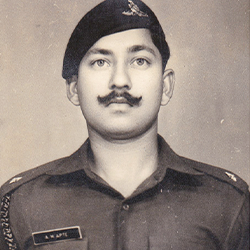
This singular commitment was reflected in the manner that the schedule was designed: from the first bell that went off at 5 am to the NDA prayer (the sole spiritual learning propagated for the officers) to the never-ending parade of activities for the day—from PT to drill to swimming to academics to horse-riding. The first rule was respect for time—you had to complete the given task and be on time for class irrespective of what happened, whether you had been punished by your battalion cadet captain or forced to take a detour to clean tea off your uniform.
Initially, it was tough—the reality hit me almost as hard as it hit everyone else, there was no cutting corners anywhere. We were on our toes from morning to night; the interruptions were many—you couldn’t even finish your chai in peace. The struggle at each level seemed unending — from the rigorous physical regimen to keeping up your grades to being punished for the smallest things. But then, they were grooming us for battle, when every moment counts.
Ragging was a part of this toughening up process; most of what we cadets were put through was just to test our ability to withstand stress and make us resilient — physically, mentally, and morally. You must be geared for the hardships that are bound to come your way, for situations where no textbook works, only your ability to handle stress.
Indeed, much of this is tough for a teenager to take on, but the beautiful poem “If” by Rudyard Kipling, was hung up in the rooms to serve as a reminder of who we were meant to be - “If you can keep your head when all about you are losing theirs and blaming it on you; If you can trust yourself when all men doubt you...”
The NDA taught us to be leaders in more ways than one. First, there was a respect for time. Second, we learnt to get on with just about anyone and third, you learnt flexibility while you stayed focused on the goal. A soldier’s best duty is to put one’s comrades before self.
1971: War Nostalgia
I was commissioned as an officer in December 1970. Just eight months later, the late PM Indira Gandhi deployed the Armed Forces to support the Bangladesh Liberation War. The Indo-Pak conflict of 1971 was sparked by the conflict between the dominant West Pakistanis and the East Pakistanis. Given the oppression of the locals by the West Pakistanis, the Indian Government supported the creation of a separate state for ethnic Bengalis.
I was all of 21, a second lieutenant serving in an artillery regiment in Jessore-Khulna sector. I was the Gun Position Officer or GPO of an Artillery Field Battery with six 25-Pounder Guns. Though the war formally commenced on Dec 3, 1971, I fired my first salvo on 28th September, in the tense run-up to hostilities.
Here too, the camaraderie facilitated by the NDA came in handy. On Dec 5, 1971, we found that the bridge across the Kabadak River had yet to be completed. My senior from the NDA helped me out. He gave me rafts to take my guns across the river for the battle of Jessore.
The war ended formally on Dec 17, 1971—with considerably more casualties on their side. On a personal level, I got to know of my cousin Flt. Lt. Pradip Apte being shot down on the first day of the war. He was posthumously awarded the VrC.
Homes on both sides have borne the weight of this sacrifice, for that is what war is—a sacrifice that demands you lay upon its altar the dearest and the best. But, we did get to savour success when ceasefire was announced on Dec 16 and Dec 17.
We now negotiated the public surrender of the Pakistani troops—the largest public surrender recorded in history. The Pakistani 107 Infantry Brigade had been defending the Jessore-Khulna sector. They gathered in a school nearby to hand over their insignia in a formal ceremony.
When an enemy turns out to be a school mate
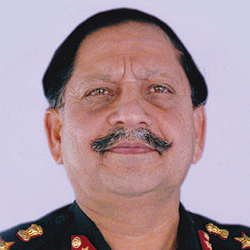 Brigadier Ajit Apte (Retd.)
Brigadier Ajit Apte (Retd.)(Batch - 1966-1969)
Both sides treated each other with respect. The Pakistanis served us tea and pakodas; they were cordial despite the humiliation. Among them was an officer called Lt. Qurban Ali whose briefcase was in my custody—after the final face-off between our troops at Siramani near Khulna, where we had to clear some obstacles. As I explored the bunkers and trenches, I found the briefcase. Interestingly, there was a photo album and letters from a girl called Lily, possibly his sweetheart. The briefcase contained her pictures. In fluent English interspersed with urdu, she said her aunt would persuade her parents to let them marry. Presumably, her parents did not want the alliance. Up until then, the couple had my empathy. But what angered me was that even as she mentioned that the clouds of war were gathering, she exhorted him to CRUSH INDIA, in capital red letters.
I recognised Qurban Ali from the pictures in those albums. As we conversed, I realised that he and I had both studied at St. Francis School in Lucknow, but he had been a student before I joined. His parents had migrated to Pakistan in 1956. This was a surprise. I returned the briefcase to him, minus the letter.
The offensive letter is still with me—laminated. To this day, I wonder whether he and Lily had their happy ending. I certainly hoped they did.
STRATEGIES OF SURVIVAL FOR THE CORPORATE WORLD
Strategy one: It would be adaptability and flexibility. As a brigadier I was a one-star general, but on retirement, I learnt the rules of a new world.
Strategy two: Getting along with people is the key to success irrespective of where you are.
Strategy three: The leader is judged by his team. There are two ways to be a leader: the first way is to impose your personality on everyone, and the second is to trust each one in the chain of command to do what they should.
Strategy four: In the armed forces, when someone is a wounded casualty, we don’t replace them. We learn to make the best of what we have.
Strategy five: Respect your women colleagues. Pulling out chairs and opening doors doesn’t lessen you. As is clear, the army prepares you for the thoroughly VUCA (volatile, uncertain, complex, and ambiguous) world that corporates are told about.
Doing it right, Always...!
Group Captain Anant Bewoor chose the blue uniform of the IAF over the olive green of his late father, none other than General Gopal Gurunath Bewoor, who took over as Chief of Army Staff, succeeding Field Marshall Sam Manekshaw.
Leadership, says this erstwhile transport pilot, is not about grand words. It’s about action. So, whether it was simply watching how his softspoken dad dealt with people, at work and on social occasions, or taking into account how the senior cadets demonstrated the honour code of the academy by caring for their juniors, his most enduring lessons were through observation.
In 1971, one of his tasks was electronic surveillance to find out the location of Pakistan Air Force radars.
He went on to become commanding officer of the 44 Squadron, which flies the IL-76 heavy lift military transport aircraft
By Kalyani Sardesai
"In the NDA, you are a part of a system that demonstrated leadership, commitment, and discipline, through actions great and small"
Those were the days
I joined the NDA on July 12, 1961—the day the Khadakwasla Dam burst due to a breach in the construction of its wall—not to mention the intense rain and pressure of water in its hold. While I was studying in NDA, President John F. Kennedy was assassinated, and the Chinese aggression of 1962 left the country shaken. I passed out of NDA in May 1964, on the back of Pandit Nehru’s death. But none of this affected our training and schedule—a fitting metaphor for a fauji’s life and motto. No matter what happens, you must carry on. We were happy, carefree teenagers who thoroughly enjoyed the ambience and the greenery—taking the rigorous schedule of the academy in our stride—emerging all the stronger for it.
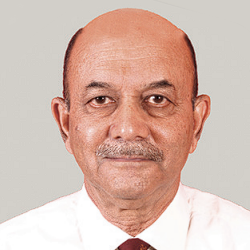 Group Captain Anant Bewoor (Retd.)
Group Captain Anant Bewoor (Retd.)(Batch - 1961-1964)
As an army officer’s son and alumni of the military school Rashtriya Indian Military College(RIMC), Dehradun, I was expecting the rigours of the academy. The discipline and decorum that went with the turf was a logical progression of being schooled in a military school—though of course, the NDA took it to the next level. There is a precise, well-thought out system in place at NDA that ensures that every 45 minutes a cadet is put through the next task of the day, with no room for confusion. From public speaking to academics to sports and horse riding, each and every aspect of a young person’s personality was mentored and honed. We were confident for a reason. We could survive the toughest tests. These days ragging in most educational institutions is a no-no. But, the ragging that a cadet was put through was responsible and meant for a purpose—to prepare you for adversity. It was never cruel or humiliating and the rules were clear on the parameters - you could not touch or abuse a cadet when they were being ragged or punished. Amidst all this, you made lifelong friendships and that was the best part ever.
In the NDA, you are a part of a system that demonstrated leadership, commitment, and discipline, through actions great and small. At no point does a cadet feel—oh who do I go to? Your seniors, your buddies and comrades are all there for you. The Honour Code is clear on the dos and don’ts of both life and service. You are supposed to do the right thing, even when no one’s looking. And that’s useful insight for a youngster to have.
Locating their radars and positions as an officer of the IAF
From the outset, I was clear that it was a life in the Air Force for me—the fact that one of my childhood homes was along the Ambala runway, where my dad was posted—had much to do with it. I used to watch the planes flying overhead, wheels down preparing to land. Luckily, I qualified medically too. The sixties were a significant time politically and militarily. The Chinese aggressions of 1962 and Pakistan war of 1965 were etched in memory.
1971: War Nostalgia
The 1971 face-off was something that we had been prepared for mentally, given the ten million Bangla refugees pouring into the country on the backdrop of Pak-perpetrated atrocities. The only way we could resolve this was militarily. My dad was GoC-in-C of Southern Command which had moved to Jodhpur from Pune. I was tasked first along the Eastern Front, and then the Western Front. I received no lectures from him; it was our task as professional soldiers to take what came in our stride and simply get on with it.
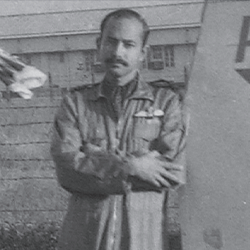
As a transport pilot, one of our tasks during and in the build-up to the war was flying along the borders of our territory to find out the location of Pakistani Air Force radars. Electronic intelligence is critical—you want to fly as close to their airspace as possible, without leaving your territory as you will be shot down. We did this at regular intervals, along both East and West Pakistan border. And we did repeat runs a few months later. Every radar has its own peculiar signature that can be recognised and recorded. So if during the repeat sweep, the radar was located at a different place, you knew this was a mobile radar and not a static one.
Naturally, this was vital information to possess—the pucca position of each radar—given that there was no satellite imagery at that time. One of my tasks on the night of Dec 3, 1971, before our people went into war, was the final sweep along East Pakistan between 1900 hours and 2100 hours to confirm the radar ORBAT or the Order of Battle of the Pakistan Air Force Radar network, and co-relate it with the information gathered thus far. This way the fighters and bombers went in knowing which radars were where, and how to avoid them.
STRATEGIES OF SURVIVAL FOR THE CORPORATE WORLD
I became a corporate professional after early retirement in 1994 and retired as VP Product Sales in Onward Technologies that specialises in CAD/CAM. In my presentations to young corporate engineers over the years, I like to stress a few things: Number one, pressure brings out a different side of people. The most unexpected folks shine under stress—whether it’s on the battlefield or in a boardroom—so expect those surprises. Number two, even as I narrate the stories of braves like Vikram Batra, Manoj Pande and Arun Khetarpal, I ask them to bear in mind that they too come from the same stock, and same system. They don’t need rifles to shine, a keyboard and commitment to their chosen field is enough. They must find that potential within themselves, look for it and come into their own. Number three, preparation is everything. Excellence comes from painstaking attention to detail. While the corporate world is all about achieving larger profits and a bigger bottom line, bear in mind that haste makes waste.
NDA is tailored to build discipline
One of the most fulfilling jobs that you can possibly do is to serve in the armed forces, so says Commander Indrajit Roy, who is a Batch 1965-1968 (34th NDA Course) pass out of India’s most prestigious joint defence service training institute of the Indian Armed Forces, the National Defence Academy (NDA). The fact that your efforts have a direct bearing for the well-being of the nation is very satisfying. He talks to Corporate Citizen on his nostalgic memories about NDA training period, the leadership lessons that he learnt as part of the training and service in Indian Navy, the part he and the Indian navy played in the 1971 Indo-Pak War and much more
By Rajesh Rao
Realisation that the country depends on you, and the fact that what you are doing counts for something for the nation, in itself is a very satisfying and unique experience. You will never get that experience anywhere else. And, NDA is the one that fosters that zeal
Those were the days
I come from a service family; my father was in the army. I am a Bengali, born in Jalandhar, in Punjab. My grandfather, who was an IPS officer, was very nationalistic. So, the urge to serve in the armed services was always in our family. I grew up in Mussoorie, Uttarakhand, where I did most of my schooling and also in Hazaribag, Jharkhand. Soon thereafter I joined the NDA in Pune in 1965 in my first attempt and opted for the Indian Navy.
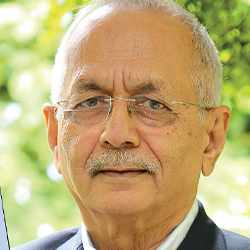 Commander Indrajit Roy (Retd.)
Commander Indrajit Roy (Retd.)(Batch - 1965-1968)
The curriculum at NDA is very intense and requires one to be motivated, so as not to give up when it becomes physically and mentally challenging. The first two years is common for all and during the third year, cadets are streamed according to their Service (Army, Navy or Air Force) and they start learning relevant trade craft. For example, naval cadets are taught nautical navigation, i.e. find one’s position in the middle of the sea without any references except the celestial bodies, or sailing or passing messages by flags etc.
The entire duration of training is tailored to build foundations for discipline in its broadest sense, leadership, dedication and esprit de corps. Since these are intangible traits they have to be imbibed during various routines done in the academy. For example, they will tell us to climb a hill with heavy back packs. Say, if one of your teammates has sprained his ankle halfway while climbing, someone will help him and also carry his load. So, like that you learn comradeship. You also learn leadership, to lead everybody. The concept is, if you do something wrong, the whole team gets affected—in the corporate world also if an employee makes mistakes, the whole company gets affected. But, if we have a person who does well and he permeates that to everybody down the line, then the company does well. The main goal is to groom a brave soldier out of a young cadet.
The metamorphosis
The initial years in the academy is one of metamorphosis, to mould young motivated strong men, capable of taking the rigours that will inevitably come and pushing boundaries in yourself – both physically and mentally. The military way of achieving that worldwide is to subject the cadets to ever increasing stressful situations. When those tasks are successfully accomplished one builds up one’s self-confidence and the can-do attitude.
One such exercise is Camp Rover which is held in Andgaon along the Mutha River. It is a four-day camp where cadets are pushed beyond what they thought was their limit. Like a 40 km walk-and-run through wilderness and hills with an instructor shouting and extolling you to hurry. Also move around at night in those environs without sleep for two nights. During this training, one becomes mentally strong and also develop leadership qualities. Qualities like I can do this, I can lead people, I depend on everybody and everybody depends on me and so on.
The Orchard Raids
In those days (1965-1968) the places surrounding NDA was covered with lime tree orchards. So, at 10 pm in the night, when everyone is supposed to be sleeping, 5-6 of us would surreptitiously go to the orchards and pluck sweet limes and carry them back to our rooms. We used to call it orchard raids. On hindsight, a childish thing. The fun part was, we were doing it in the night and we must not get lost, we must not fall and must not get caught under the pain of getting relegated i.e. being demoted.
The Nautical Way of Life
After finishing three years at NDA, those joining the navy go to a ship. It is a naval training ship where cadets are metamorphosed, this time into sailors. Those six months on board are very intense, because you are getting used to a nautical way of life. Imagine, trying to walk on a deck which is moving violently in all three dimensions, and then learning to do complex tasks in that environment. At NDA they maintain the fundamentals of strength, character, will to do and perseverance—those traits must remain.
1971: War Nostalgia
During the 1971 Indo-Pak War, as part of Indian Navy, we were one of the first who carried an attack on Karachi. In the naval warfare, we are not fighting one-to-one, we are not seeing the enemy also, it is all through radar and other equipments, and then you press a button and shoot. If you are right on the target and it hits, three hundred people die. There is huge amount of technology involved in naval warfare.
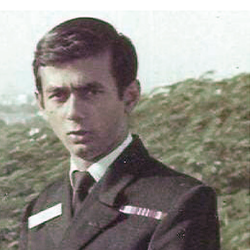
In 1965 Pakistan navy bombed Okha, in Gujarat, from the sea. We didn’t want the repeat of that, so few missile boats were stationed there. For the Karachi attack, some missile boats were towed and another joined the attack group from Okha, and then proceeded for the attack on Karachi. We sank about three ships there, one of which was carrying ammunition and two other Pakistani naval warships. This had the effect of not allowing any supplies to come to Karachi and strangling the war effort in the west. This is called a blockade. Because of the blockade, their army and navy war got affected. So, the outcomes of naval warfare are always like that.
Our navy doesn’t go to the land and capture territory, unlike the marines. The navy makes it possible for our army to do so. By controlling the seas around the enemy area one denies its use by them at the same time it allows us to use it to our advantage. This, in essence is called sea denial and sea control. During this attack naval missiles were used for the first time to destroy land targets and ushered in the whole concept of land attack missiles from sea, like Tomahawk missiles.
Country First
Serving in the armed forces is not a job but a calling. There is a realisation that the country depends on you, and the fact that what you are doing counts for something for the nation, in itself is a very satisfying and unique experience. You will never get that experience anywhere else. And, NDA is the one that fosters that zeal.
STRATEGIES OF SURVIVAL FOR THE CORPORATE WORLD
NDA trainings are tailored to build foundations for discipline in its broadest sense—leadership, dedication and esprit-de-corps. Since these are intangible traits, they have to be imbibed. One becomes mentally strong and also develop leadership qualities—qualities like I can do this, I can lead people, I depend on everybody and everybody depends on me and so on. The trainings mold young motivated strong men, capable of taking the rigors and push boundaries–both physically and mentally. The military way of achieving that is to subject the cadets to ever increasing stressful situations. When those tasks are successfully accomplished one builds up one’s self-confidence and the can-do attitude. These traits are useful even in the corporate world.
Leadership skills par excellence
Soaring through the skies, Squadron Leader Milind Baliga wears his love for the country proudly on his sleeve. Here’s the captivating tale of his remarkable journey
By Ekta Katti
My love and respect for NDA knows no bounds. The credit certainly goes to the teachers of NDA. The strict schedule and the invaluable knowledge they shared, made me realise my duties even better
Squadron Leader Milind Baliga’s appearance may initially project a sweet and shy demeanour, prompting one to ponder what such an individual would be doing in a war. We asked Baliga and he was quick to respond with the brightest smile, “The love for your country can push you to do anything.” It is often the deep-rooted patriotism and dedication to one’s nation that drives individuals like Milind Baliga to serve in the armed forces, despite their seemingly gentle nature.
Those were the days
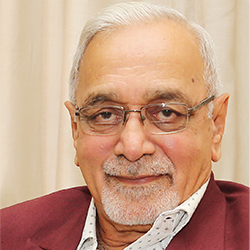 Squadron Leader Milind Baliga (Retd.)
Squadron Leader Milind Baliga (Retd.)(Batch – 1965-1968)
Baliga hails from the quaint town of Hubli in Karnataka. Even though he had no intention of joining the NDA as a teen, he was well aware of the significance and influence held by this organisation. “Of course, it is one of the most prestigious organisations where all the three wings of the Military Services come together. It was my friend Prakash Rao, who first told me about the NDA—I decided to take a chance and gave the entrance exam, and performed really well. When I entered NDA for the first time, I could sense an atmosphere imbued with love, patriotism, camaraderie, and beyond. I wouldn’t hesitate to declare it was love at first sight,” smiled Baliga.
Without a doubt, the training at the NDA has the power to metamorphose a civilian into a cadet, and subsequently a cadet into an exemplary gentleman. The remarkable transformation of Baliga was truly a sight to behold. “My love and respect for NDA knows no bounds. The credit certainly goes to the teachers of NDA. The strict schedule and the invaluable knowledge they shared, made me realise my duties even better,” he said.
Baliga’s tenure in the NDA, spanned from 1965 to 1968. Talking about one of the most memorable incidents, he said, “To get into the NDA’s cricket team was indeed a matter of pride for me. I patiently waited for the right opportunity, and though it took a long time, I seized it with determination. From that moment on there was no looking back and I was determined to leave a lasting mark on the team.” Baliga went on to become one of the best batsmen NDA has produced, for which he later received the maroon blazer, an honour given to soldiers who display exceptional cricket skills.
1971: War Nostalgia
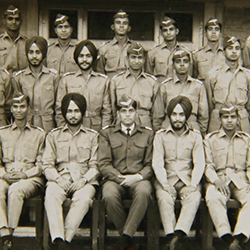
Giving us the literal bird’s-eye view of the 1971 India-Pakistan war, he said, “The moment we were forced to set foot in the war, we understood that there was no turning back and that triumph was assuredly ours. We were undeniably destined for victory, as evidenced by our complete dominance over the opposition. The certainty of our success was etched in stone, destined to be remembered as a historic moment. Victory was always ours”.
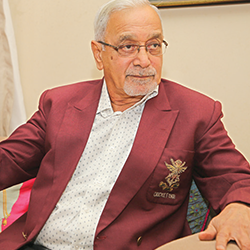
He continued, “Despite the official commencement of the war on December 3, 1971, 22 Squadron managed to shoot down the first three Sabres of the Pakistani Air Force on November 22, 1971. Being aware of the opposition’s retreat strategy, we deployed Combat Air Patrol (CAP)s to ensure the safety and clearance of our path. The remarkable synchronisation of the CAPs left the opposition astonished, granting us a significant advantage as the imminent war approached. Once the war began, their response to our attacks was non-existent. The Indian Air Force proceeded to bombard their runways, leaving them with no respite or opportunity to regroup. Consequently, the enemy’s air defence became incapacitated, leading to acessation of aerial engagements. The war continued for a few more days before its eventual conclusion.”
So, what do you make of this war? “The war revealed a crucial lesson: trust can be placed only on your teammates. Also, the extreme circumstances made us believe that everything is fair in love and war. Amidst the chaos, emotions run high and can interfere with our judgment, so we need to be calm and composed in every situation. The enemy’s actions included shooting down several Hunter aircraft and claiming the lives of numerous soldiers. It left us with a heart-wrenching sight as we witnessed our comrades falling before our very eyes,” said a teary-eyed Baliga.
Words of wisdom
After serving the nation for years, Baliga is now enjoying his retirement with his better half in a quaint area of Pune. To mould the youngsters of our nation, he said, “They must be taught the value of serving our nation during the school days. This gives them enough time to make a decision. Proper sessions must be held to enlighten them. The kid must be resilient and should hold the highest regard for their nation.”
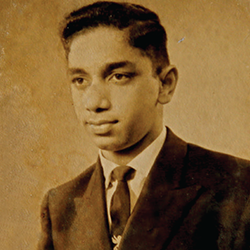
Neena, his wife exuded a spark of pride and a deep sense of accomplishment attributed to her husband. She expressed, “More than anything, I feel a tremendous sense of pride and fulfilment. His remarkable journey in the Air Force has been nothing short of extraordinary. The date of our marriage holds historical significance as we tied the knot on November 22, the very day the war commenced. I am proud to be his wife, and our children too share in that same sense of pride.”
Even to this day, Baliga’s love for his nation remains boundless, as he proudly proclaims, “I am proud to be India’s child.” His unwavering patriotism and deep-rooted connection to his homeland exemplify his enduring love for the country that shaped him.
STRATEGIES OF SURVIVAL FOR THE CORPORATE WORLD
The leadership skills and virtues, such as loyalty and patience, honed during Squadron Leader Milind Baliga’s time in the Air Force, continued to shape his post-retirement work-life in the corporate world. “The Military to Management journey has been smooth, thanks to the valuable experiences the Indian Air Force provided me with. The experiences and lessons from my Air Force career have greatly facilitated my future endeavours. It has taught me to never give up and overcome every challenge with a smile on my face, and I applied that throughout my management journey. The trainings have made my path smoother and equipped me with valuable qualities that have contributed to my successs,” he said.
The skills and values cultivated in the Air Force had a lasting impact, enabling him to navigate his professional life with greater ease and effectiveness